Chungking Mansions — The World Inside the Building
One building in Hong Kong houses a diverse international community that has a major impact on trade all over Africa and Asia.
Cover photo: The main entrance to Chungking Mansions is via escalator from crowded Nathan Road. On the ground floor and first floor there are retail and wholesale shopping areas, while the second floor is occupied by a shopping mall. The third to the 17 floors of three blocks contain mainly guesthouses reachable by staircases or tiny elevators. Different blocks can be reached only by returning to the ground floor. (Photo: Paul Hilton)
Chungking Mansions is a dilapidated 17-storey building at the heart of Hong Kong’s tourist district. Thousands of people of any of the 129 different nationalities recorded in the guesthouse logs stay in the guesthouses on any given night. The building’s already dodgy reputation was immortalised in Wong Karwai’s 1994 movie Chungking Express.
While to an outsider the building may seem a dangerous ghetto, for the insider it is a shot at prosperity. Here one can find Pakistani merchants, African buyers, American hippies; Hindus, Sikhs, Muslims; tiny hotel rooms, money-changing stalls, curry stands, internet cafés, snack bars, barber shops, laundries, computer repair services, prostitutes; stores selling mobile phones, clothing, shoes and watches; a constantly changing kaleidoscope of business and cultural interchange. Perhaps the only thing that seems to be lacking is native Hong Kongers.
Anthropologist Gordon Mathews started researching the building in 2006, staying in all 90 of its guesthouses, spending every available moment there in an effort to answer questions like ‘What has brought all these different people here?’ and ‘Why does this place exist?’ His research culminated in his book Ghetto at the Centre of the World. Peter Biľak spoke to Mathews about how the Chungking Mansions traders do business and why they carry their goods in their suitcases instead of shipping them in containers: in short, about how most of the world experiences globalisation today.
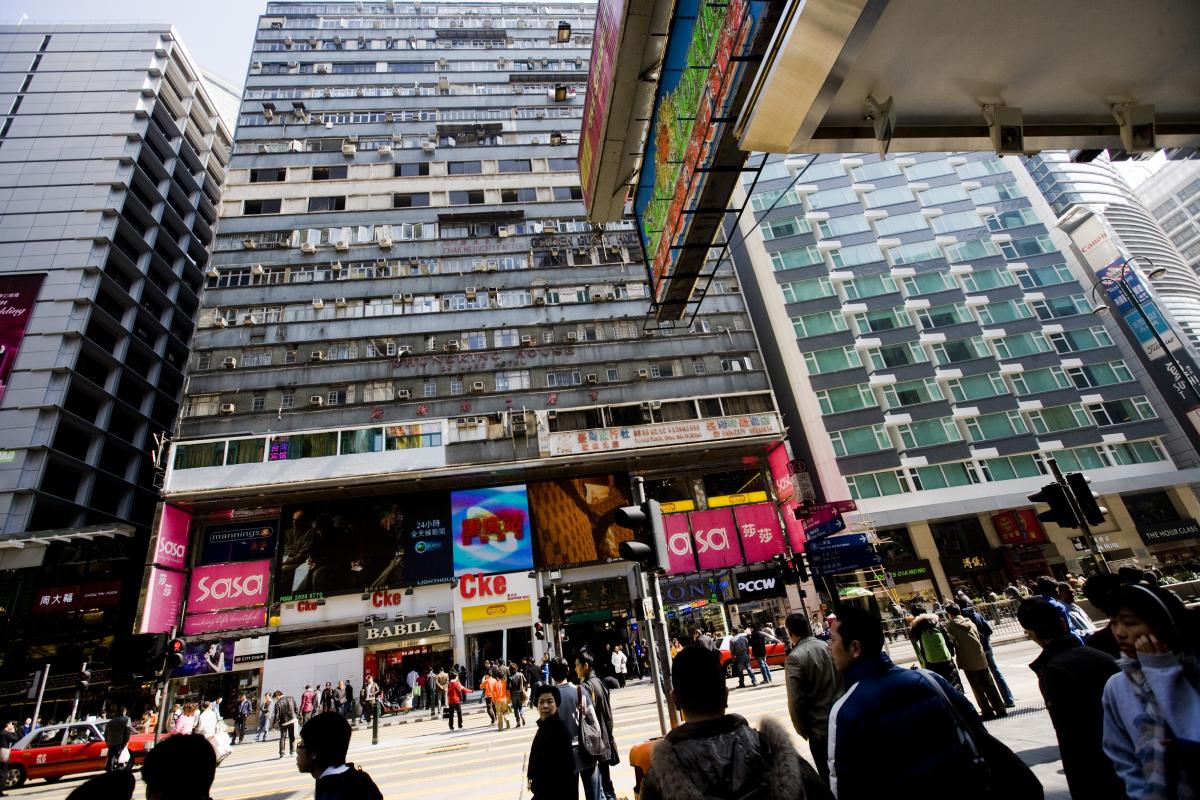
Chungking Mansions is a building providing some of the cheapest accommodation in Hong Kong and functioning as a gathering place for ethnic minorities. In addition to the guesthouses, there are also hundreds of stores, restaurants and exchange offices. (Photo: Paul Hilton)
Peter Biľak: Hong Kong ranks amongst the most globalised economies of the world. Why Hong Kong? What makes it so particularly suited to being the centre of globalisation, and what does this mean for the rest of us?
Gordon Mathews: One thing about Hong Kong is that it always has been an open port, and that’s how it’s made its money. And so unlike many other societies that want to protect their citizens through immigration restrictions, Hong Kong has had much more of an open border. There are visa restrictions, of course, but Hong Kong has been different from other places in terms of allowing people in for business purposes. And this is particularly true when it comes to people from the developing world.
Unlike many other societies that want to protect their citizens through immigration restrictions, Hong Kong has had much more of an open border.
When did you first hear about Chungking Mansions?
I’ve known about Chungking Mansions for most of my adult life. The Lonely Planet guide came out when I was in my early twenties and it had statements like, ‘If you go to Hong Kong, the place to stay is Chungking Mansions’. And all the hippie travellers and backpackers of that era would stay in Chungking Mansions. Anybody with dreams of travel knew about Chungking Mansions back then.
What inspired your deeper interest in the building?
In the early 1980s when I first stayed there, I wasn’t very interested in the building. It was just a matter of needing to stay in a place where I could save my pennies. My anthropological interest came only much later. Being in a place like Hong Kong that is 94% Chinese and then seeing this building where there’re no Chinese, or very few Chinese, obviously piques a person’s interest, and I wondered what was going on here.
Tell me about the history of the building. You mentioned the 1980s when it functioned mainly as a cheap hostel. Is it different now?
No, it’s not changed a whole lot. When it was first built in 1961 it was said to be a rather luxurious place. I don’t know if that’s true because Hong Kong then was rather poor. But by the late 1960s it was already falling apart; there was prostitution going on there, among many other things. In the 1970s it became more a centre for backpackers passing through, and because the building hasn’t had a unified ownership scheme, there were 900 different owners, so anybody who wanted to take their apartment and make it into a guesthouse could. And lots of people did, so that in the 1970s and 1980s many small apartments became guesthouses. And that’s still the case today.
The change that took place is that, beginning in the 1990s, there were fewer backpackers travelling through and many more developing-world traders; as China developed as a major manufacturer of goods, many people from Africa, Asia and South East Asia wanted to do business in China, and Chungking Mansions was the place to go as a base for that. And so the population of the building really did begin to shift then, but still it was the same basic structure of a lot of guesthouses, businesses on the ground and first floors, a lot of people from all over the world passing through—so fundamentally it hasn’t changed all that much.
Hong Kong is known to have some of the most expensive real estate in the world. How can this building, which offers the cheapest hostels, cheapest restaurants and cheapest stores, survive there?
That’s a huge and fascinating mystery. And it’s extremely important to understanding Chungking Mansions, because within 100 yards of Chungking Mansions you have two of the newest and most fashionable shopping centres in Hong Kong. Right across the street from Chungking Mansions is a Michelin-starred restaurant.
You seem to enjoy a good story
Sign up to our infrequent mailing to get more stories directly to your mailbox.There are a couple of reasons for this. The biggest reason is simply that Chungking Mansions’ property owners and managers can make money through volume, so if you’re running a guesthouse you don’t need to have high prices. If you have ten small rooms that are full every night, you can still make a lot of money even at relatively low prices, and so volume wins out. And if a given guesthouse owner raises prices, there will be fewer guests—it turns out that you lose money by raising prices. And I think the property managers of the building know that by keeping rents cheap you can keep profits high.
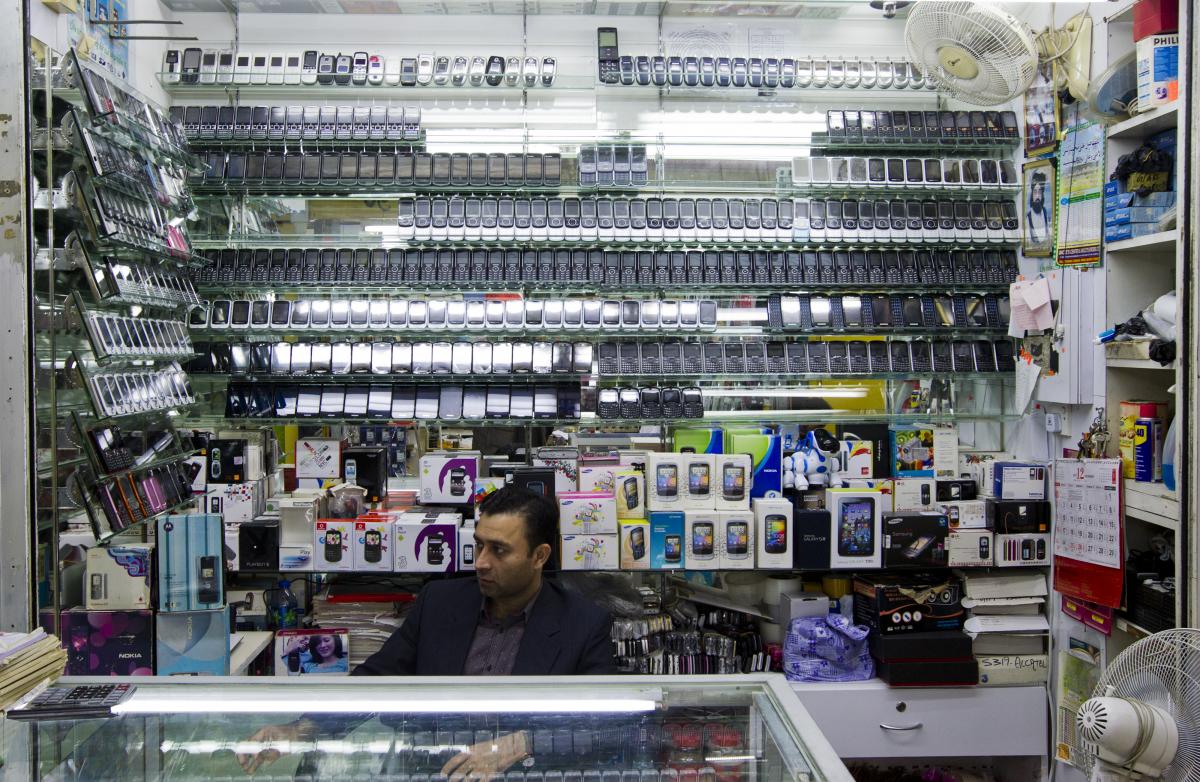
A typical mobile phone stand sells about 20,000 phones a month, mainly to African clients. The selection ranges from genuine brand-name items to used and refurbished units to outright counterfeits of varying quality. The roughly 90 mobile phone vendors in Chungking Mansions sell over 20 million units a year. (Photo: Paul Hilton)
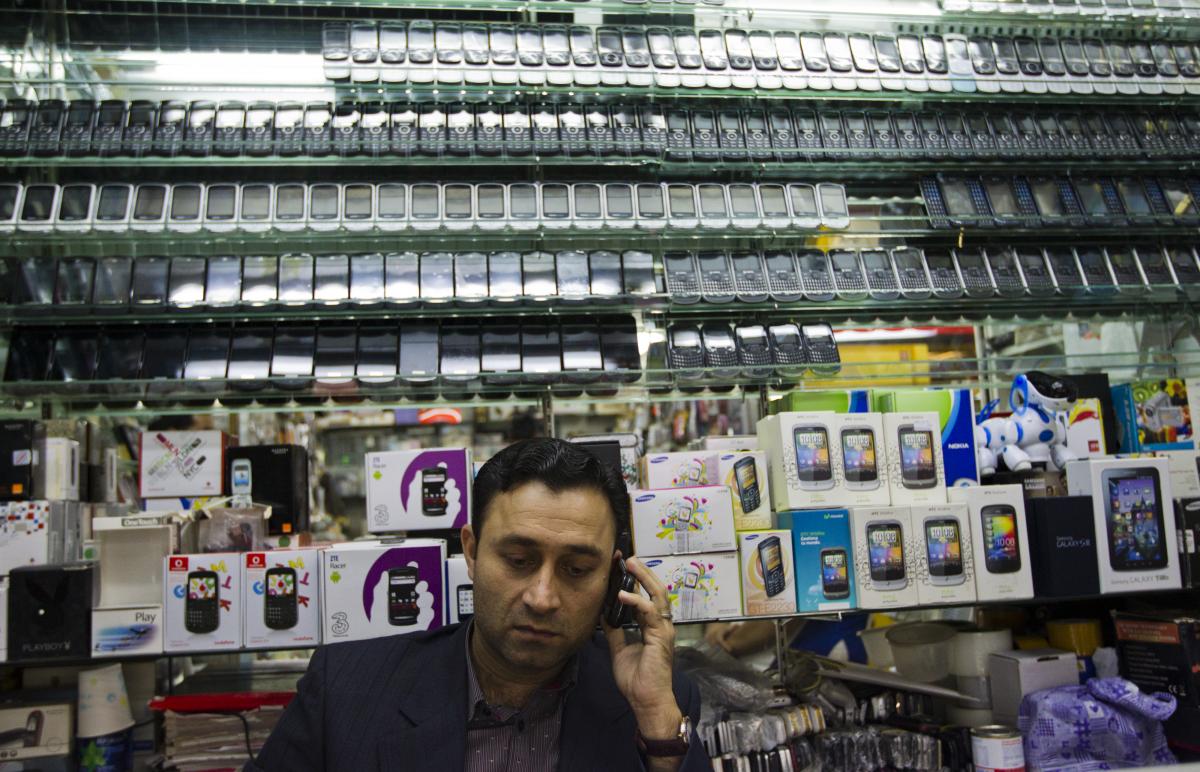
(Photo by Paul Hilton.)
Chungking Mansions’ property owners make money through volume, so if you’re running a guesthouse you don’t need to have high prices. If you have ten small rooms that are full every night, you can still make a lot of money even at relatively low prices.
In your book you write that there are some 4,000 people staying in the building at any given time. Who are they, and how do they manage to co-exist in the building?
That’s always a difficult question. These people range from Chinese families, who have lived in Chungking Mansions for 20 or 30 years, to traders from Zaire or Kenya or Nigeria coming in for a week or two, to backpackers and tourists travelling from all over the place. It’s a whole vast array of people, and it’s always changing. During a Chinese holiday you might have huge numbers of Chinese in the building; at the time of the Canton Trade Fair or the Hong Kong Trade Fair you might have a huge surplus of traders. So the composition shifts from week to week and month to month. All the different languages that can be heard, it’s always quite staggering, just the sheer amount of diversity.
These people of different nationalities, ethnic groups and religions get along because they all have the same interest: making more money than they could have made back home. This common interest enables people of different ethnicities and nationalities to co-exist with a degree of harmony.
You spent quite some time in the building. Tell me about your time there and how people reacted to your research.
I’m an anthropologist, and an anthropologist doesn’t do research by handing out a questionnaire survey; an anthropologist does research by hanging out. And what you do is go stay in a place and just spend as much time as you possibly can talking to shopkeepers, drinking beer with anybody who wants to talk, doing anything you possibly can to get to know people and their lives. And that’s what I did, and I probably have spent 150 to 180 nights in Chungking Mansions at the guesthouses. I still go there a couple of times a week, just hanging out and talking to people. It was a remarkably easy place to do research because people wanted to talk. I didn’t realise this until I had been there for a while, but basically, many of the shopkeepers in Chungking Mansions feel neglected by Hong Kong at large, and so just because somebody wanted to talk to them about business and life, many really enjoyed talking. I found that very fulfilling, how much people just wanted to talk.
In your book you describe Chungking Mansions’ activities as ‘low-end globalisation’. Can you explain what that means?
Low-end globalisation is the opposite of globalisation as set forth by the high-end multinational companies, which involves batteries of lawyers and multimillion-dollar advertising budgets. In Chungking Mansions’ trade, you don’t have that. You’ve got deals made informally, often by text messages and by phone, no more than that. You have trade often conducted with people carrying goods back in their own luggage, you know, 900 mobile phones in their 32kg (70 lb.) luggage limit. You often have trade done by individuals carrying goods back across customs. So it’s a different kind of trade, but it seems to be effective. And Chungking Mansions is hardly unique in this regard. Low-end globalisation is the way most of the world practices globalisation—it’s not done by multinational corporations. If you go to Africa, if you go to South Asia, most globalisation is done by these traders, often working under the radar of the law. That’s how it works.
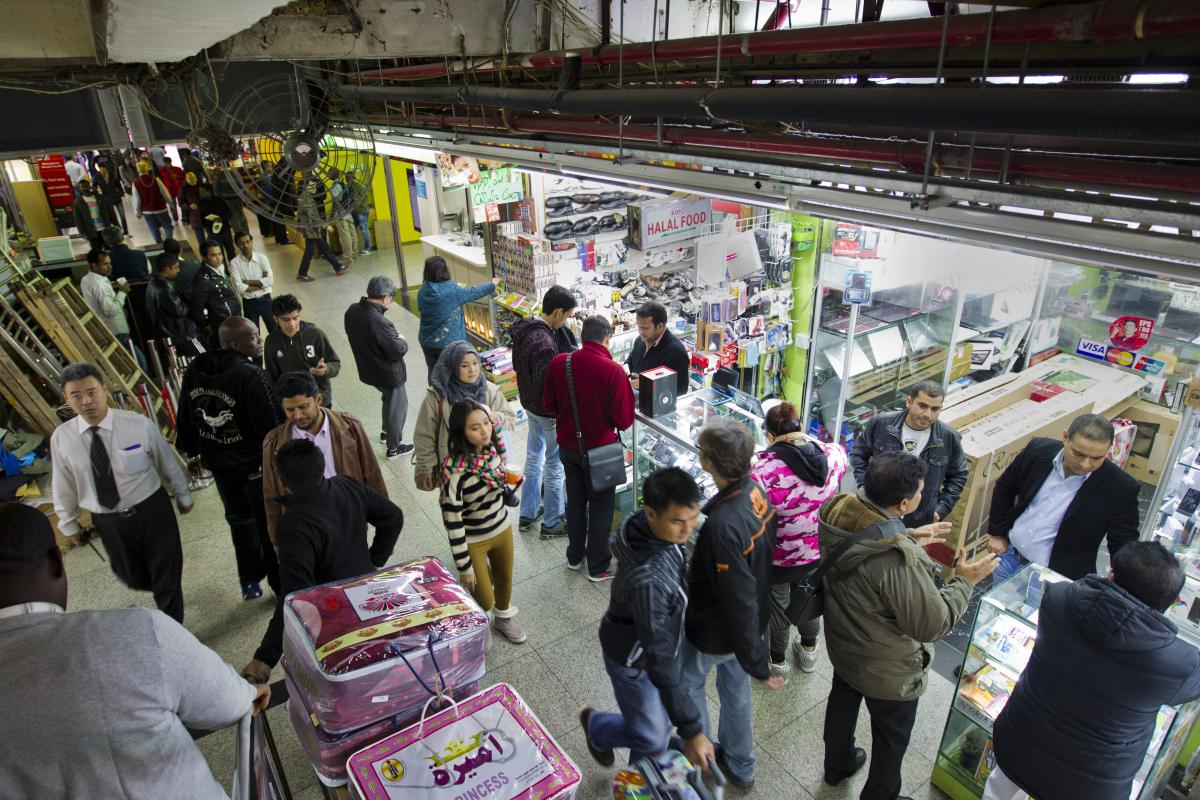
People of more than 120 nationalities converge in Chungking Mansions. In particular, entrepreneurs from the developing world see here a chance to earn money they could not earn back at home. United by mutual economic interests, people of different religions and ethnic groups coexist fairly peacefully. (Photo: Paul Hilton)
Low-end globalisation is the opposite of globalisation as set forth by the high-end multinational companies; trade conducted with people carrying goods back in their own luggage, 900 mobile phones in their 32kg luggage limit. Low-end globalisation is the way most of the world practices globalisation—it’s not done by multinational corporations.
Tell me about the typical products and typical business transactions carried out in the building.
The simplest transactions are when a trader talks to somebody at a stall selling wholesale goods, and the trader may want 600 copies of this or 2,000 models of that, and so on. That’s a rather simple trade. But there are all kinds of other versions and variations of trade that go on.
A friend of mine who works as a cargo agent found out about abalone that were caught in Somalia and then sent through Saudi Arabia. He was looking for a Chinese buyer, and he and this guy in this tiny little stall were trying to work out business arrangements between the Somalis, the Saudis and the Chinese. That’s one more deal that goes on, and this deal was worth a couple of million US dollars, so we’re not talking about small amounts of money here. There’s a whole array of different kinds of deals that go on from the simplest retail transaction—‘I want to buy a phone’—to the more complicated variations of trade involving the manufacturer in China with a middleman and warehouses in Hong Kong, shipping goods to various places in Africa, or the reverse of this, food or gems from Africa to China. These can involve a remarkably complicated sort of logistics.
There are sellers of all kinds. There is a Hong Kong Chinese opal dealer, who buys opals from Australia, which are then sent to Shenzhen, China, for processing, then shipped to his office in Hong Kong to be sent back to Australia as a tourist souvenir. The tourists who buy them are typically mainland Chinese who want to buy Australian souvenirs. However, since Australian labour costs are high and Chinese labour costs are low, these Chinese tourists are buying Chinese-processed opals, courtesy of this man in Chungking Mansions.
You mentioned a staggering figure: you estimate that 20% of the mobile phones used in sub-Saharan Africa pass through the building. How is that possible?
The traders told me that my figure was too low, that it was more than that. On the other hand, more traders are going through China, and I also think that more components are being sent to Africa, so there are some cottage factories making phones in Kenya, in Tanzania, in Nigeria, and in other places. But on average, when I did my research for my book, a phone stall might sell 20,000 phones a month, and if I multiplied this by the number of stalls, I got a figure that I could then divide into the total number of mobile phone subscriptions in sub-Saharan Africa to come up with the figure that 20% of the phones now in use in sub-Saharan Africa have come through Chungking Mansions. This, anyway, was true in 2007—2008; I suspect that the figure is a bit lower now.
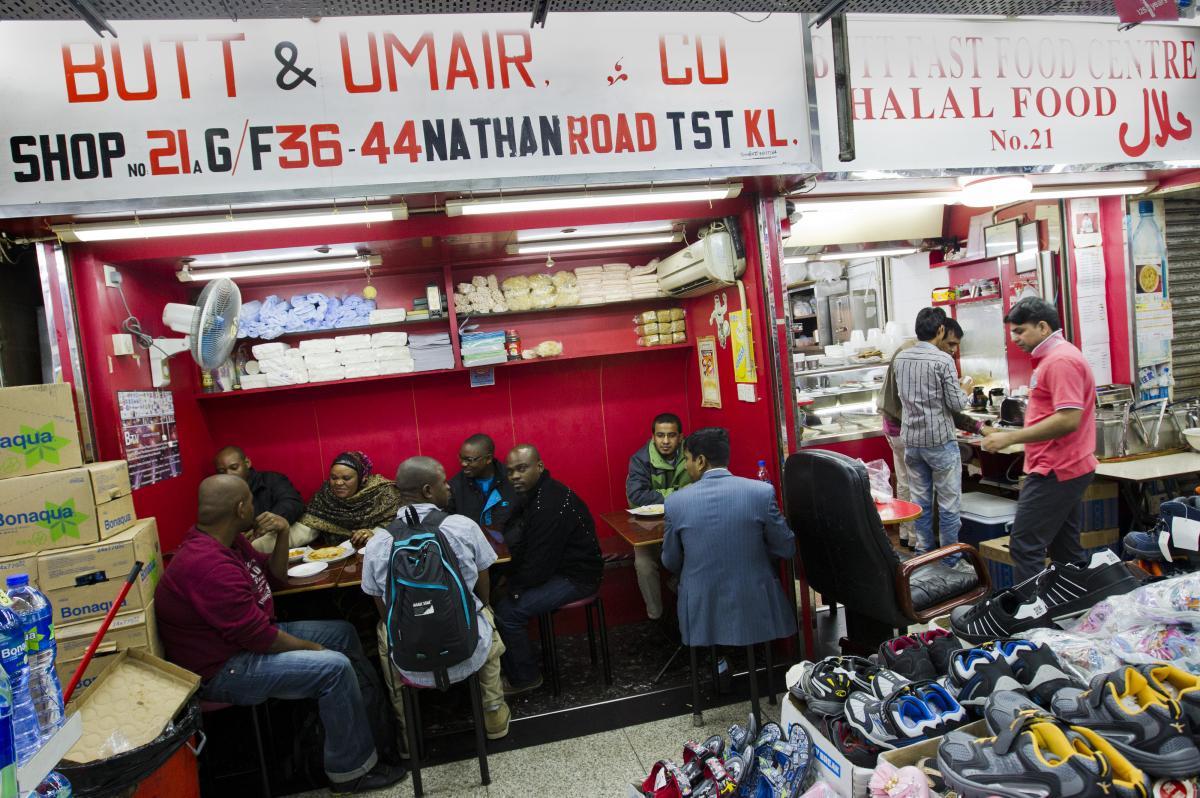
There are some 6,000 asylum seekers in Hong Kong, mostly from South Asian and African countries, and many of them congregate at Chungking Mansions. Besides its economic functions, the building also has a social function, with volunteers teaching language classes, and various NGOs assisting asylum seekers. (Photo: Paul Hilton)
How does a phone get from a factory in mainland China to an end customer in Nigeria?
It depends very much on whether you’re talking about counterfeit phones or genuine phones. Genuine phones are substantially easier because no one can easily confiscate those phones. Counterfeit phones are a little more difficult, but most of them do get by. And my estimate is that less than 1% of counterfeit goods ever get caught in Hong Kong Airport. It’s pretty easy to get them through. Bribery, too, is often fairly matter of fact. If you’re taking these goods into Nigeria, for example, you’re going to have to pay people off, but you factor that into the deal. It’s just one more business expense. This is a reasonable transaction for all concerned.
And the majority of the goods are transported out by individuals, in their suitcases?
By individuals, but these individuals are often operating with family members, with a loose confederacy of people. So it isn’t your lone individual, it’s people working together. And if you’re in Chungking Mansions, you always see people on their mobile phones, constantly, because they’re talking back to their confederates in Zambia or in the Congo or in Kenya or in Nigeria or Ghana, finding out customers’ exact orders; then they’re calling China, or the Hong Kongers are calling China. So you see these constant interactions and communications going on.
For example, a phone trader from Tanzania comes to Hong Kong once a month, buying phones from China, and taking them back to Africa as extra luggage. He takes 700 phones per trip, covering his flight and accommodation, and he makes a profit of around US$500 per trip. Others use the spare baggage quotas of their fellow traders. The phones are packaged and wrapped in a particular fashion so the screening machines will not pick up the fact that the phones have batteries in them, which is often against the airlines’ rules.
Couldn’t they just phone in their orders?
Those who have long-term relationships with their supplier sometimes stay in their home countries, placing the orders via people who come to Hong Kong. But overwhelmingly the business is done in person. In this informal economy the merchandise needs to be inspected piece by piece, and business negotiations take place face to face.
What are the typical dreams and goals of these people, and how do they try to fulfil them? I mean, I suppose most of the traders come with a desire to make money and become the new middle class.
The merchants in Chungking Mansions are predominantly interested in finding good quality and good sources for mobile phones or clothing. With phones, this is often very, very difficult because there are no prices listed. So this isn’t a simple matter of you go to a vendor who gives you a price, and you sell for a profit: no, it’s always this more complicated negotiation. Buyers had better know what they’re doing.
The buyers in Chungking Mansions often see an area that is neglected in their home country and buy products to fit that. One trader once told me that he made his biggest killing ever by buying coloured handkerchiefs. He felt that in his home country there was a real market for those, and he told me he made US$15,000 rather easily buying a lot of these Chinese-made handkerchiefs. In other cases it’s very difficult—you’ve got to be smart, because if you make a mistake you’re left with a lot of goods that just don’t work. I know one trader from an East African country who made a mistake in buying phones, thinking there would be a big market for this new Chinese model. It turns out no one wanted to buy it— there were other, better models there. So he lost US$5,000 all in one shot, enough that he couldn’t come back. So you’re always running this risk.
Large-scale cheating doesn’t happen, or else the business wouldn’t continue. One thing that has to be remembered is there is an inherent need for trust in all of these businesses: because it’s informal you can’t rely on a contract, and if you’re selling phones or buying phones, you know, you need to be able to trust the person you’re dealing with or you’ll never see them again. And most of the phone merchants I know do rely on a few dozen steady traders who keep coming back, and you can only do that by not ripping somebody off. Ripping somebody off is a way you can get a short-term profit, but in the long-term you’ll lose. And so I think there is an inherent morality that, not always but largely, tends to work here.
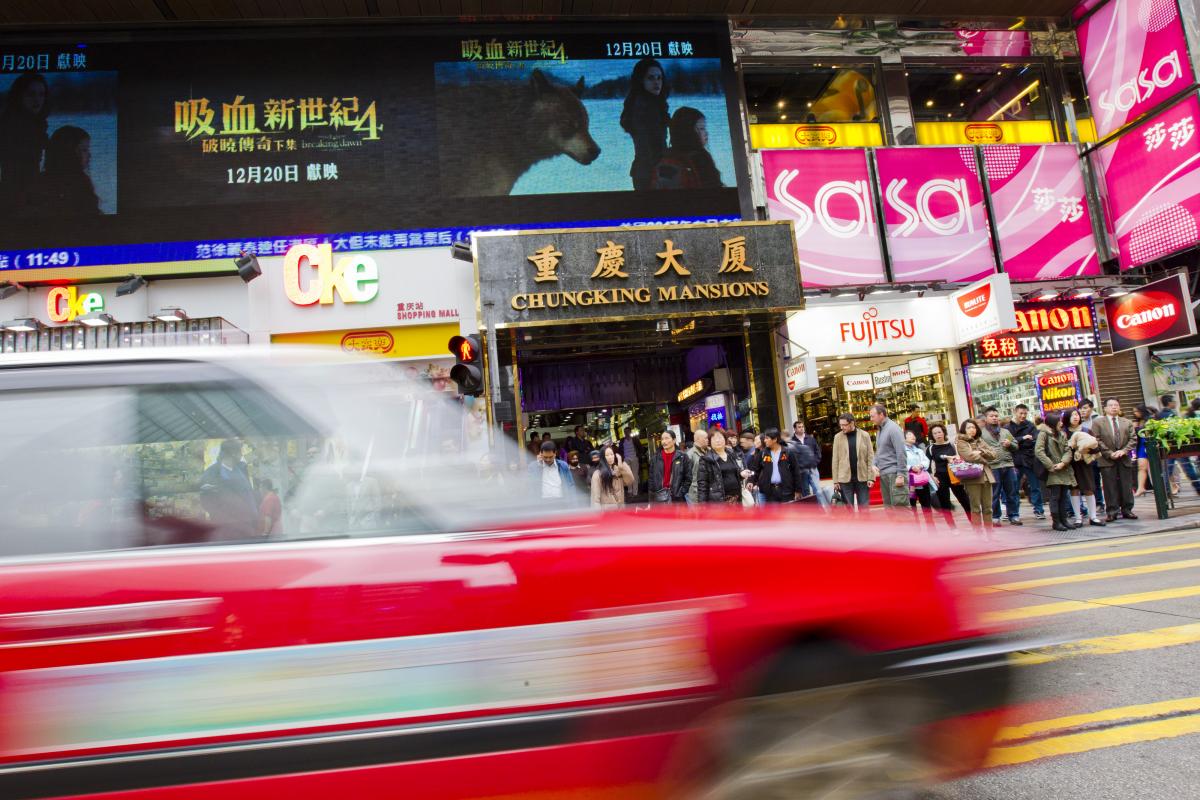
(Photo by Paul Hilton.)
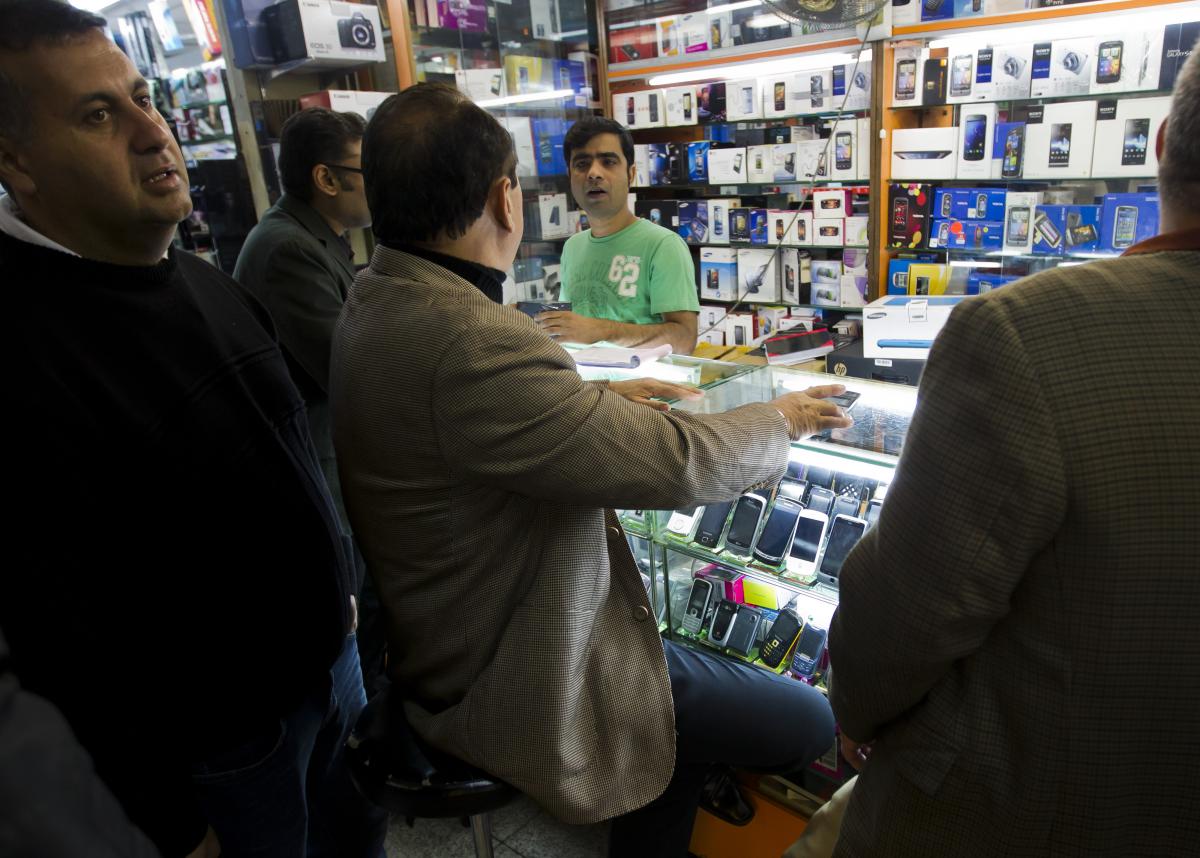
(Photo by Paul Hilton.)
There is an inherent need for trust here: you can’t rely on a contract; you need to be able to trust the person you’re dealing with or you’ll never see them again. Most of the phone merchants I know do rely on a few dozen steady traders who keep coming back, and you can only do that by not ripping somebody off.
How do the Chinese and Africans get along?
It’s a little complicated because there’s a difference between Hong Kong and mainland Chinese. Most Hong Kong Chinese know English, and English is the lingua franca of Chungking Mansions. Mainland Chinese entrepreneurs typically do not know English, and so there’s a language gap. In Chungking Mansions the dominant merchant group remains not Hong Kong Chinese, but Pakistanis. Indians too, but Pakistanis particularly. They are the middlemen between mainland-Chinese goods and African or Asian buyers. So ethnically it’s quite interesting. Language is important because now many African and Middle Eastern traders are going into Guangzhou, a large mainland Chinese city. Often it’s very difficult for them because the chances of getting cheated seem to be far higher in China, higher not because of a lack of morality on the part of the Chinese so much as because of language: if you know the language of the person you’re dealing with, it’s a lot easier to do business. Every trader I know on the mainland reports getting cheated sometimes. In Hong Kong that seems to be less likely to happen.
What is the relationship between the traders and the local police?
Traders don’t have much of a relationship because they tend to be there only briefly, say only two weeks or a month. The stronger relationships are with the merchants. And if they’re Pakistani they may have lived in Hong Kong for generations, but they still might feel excluded from the Chinese community—especially the asylum seekers. They are a really important group because many of the labourers you see on the ground floors of Chungking Mansions are asylum seekers, and often they are there to try and make a living at wages that no Hong Kong person would accept.
Some of the other asylum seekers, particularly African, are genuine political asylum seekers and have been persecuted in their home countries. These are the intellectuals of Chungking Mansions. They are extraordinarily intelligent; they come to my classes and give talks, for example. Chinese and Hong Kong university students have never met and spoken with Africans or South Asians before, and so the intercultural communication is quite valuable, and it does go on.
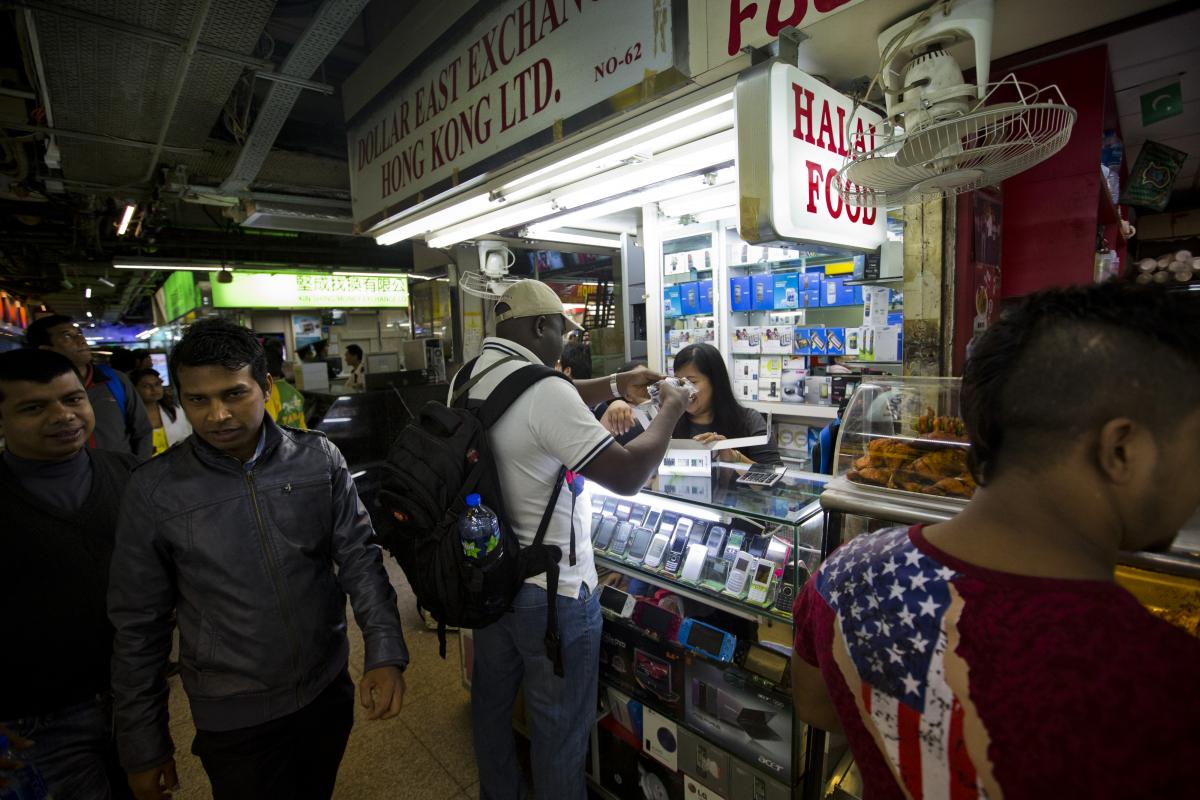
(Photo by Paul Hilton.)
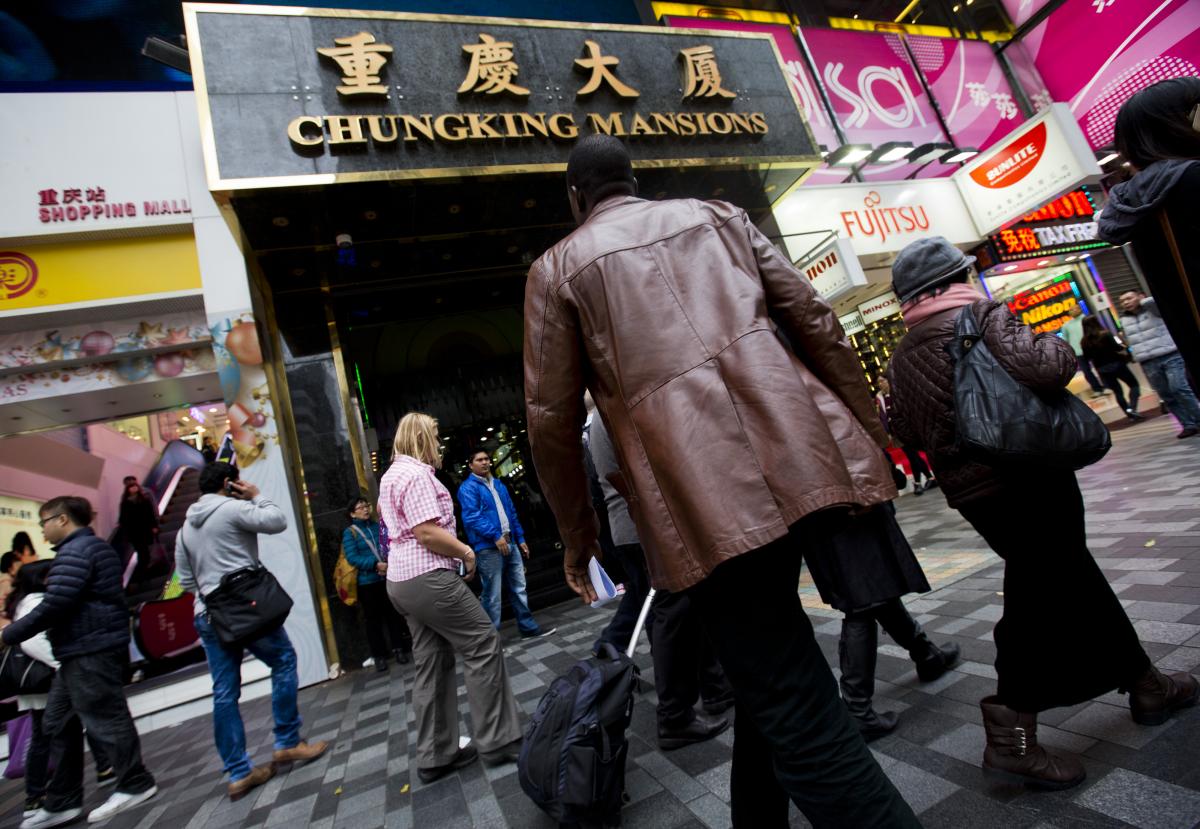
(Photo by Paul Hilton.)
So the building has a social function as well. It’s a sort of community centre as well as an international trade hub?
Absolutely. The social function is extraordinarily important because if you are African or South Asian in Hong Kong, you run the great risk of being isolated, separated from anyone you know. And Chungking Mansions is a way to meet your compatriots. So I know many, many Africans and South Asians who come back to Chungking Mansions every free evening to be with people, speak their own language.
What brings you to the building now, since your book has already been published?
I still teach asylum seekers. I have a link to these guys; I know them very well. I’m also doing research in Guangzhou right now, so I’m spending a lot of time in China, but Guangzhou and Chungking Mansions continue to be linked by low-end globalisation, and so I continue to see that. And I should also say my friends are in Chungking Mansions. I really love dealing with people in Chungking Mansions.

